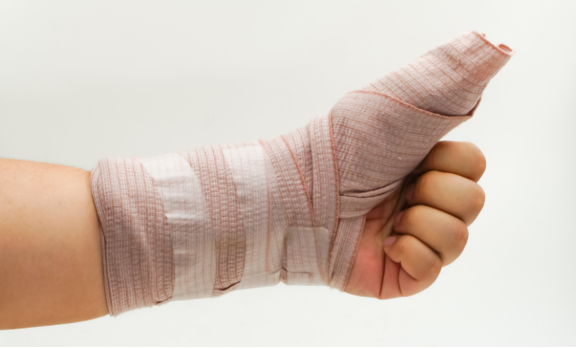Sometimes even the toughest competitors have to take it easy
Hello and thanks for stopping by! For today’s post, I’ve got a story to share with you about my friend, Pete. You may have heard me talk about Pete in other blogs. He’s one of my best friends at school this year. One of the biggest reasons we get along so well is because Pete and I both love sports.
My favorite sport is soccer. Hands down. (Literally! You can’t use your hands in soccer unless you’re the goalie. More on that later.) Pete’s favorite sport would probably be a three-way tie between basketball, soccer, and football.
Today’s blog is a story about what happens when you love playing sports too much. In Pete’s case, he learned that if you get injured, it’s important to slow down to let your body heal. No matter how much you hate sitting on the sidelines. Even the toughest competitors sometimes have to take it easy.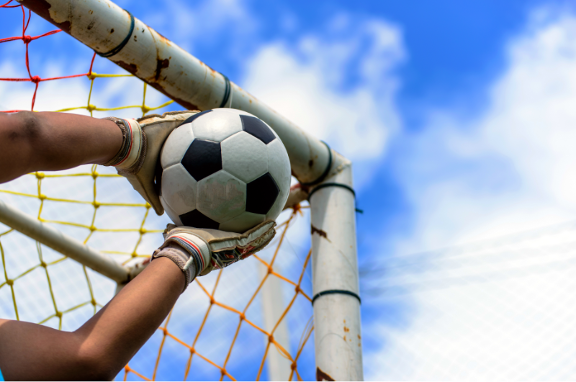
Goalie tending
Like me, Pete plays soccer on the weekends. We’re in different leagues, so we never get to play against each other. (I’d probably beat him, though- ha ha!) In Pete’s league, all players are required to attend to something called “Goalie Training.” Pete told me all about it…
Goalie Training is exactly what it sounds like: a special practice that teaches you about the basics for how to play the goalie position. The goalie is one of the most important—and hardest—positions in soccer. That’s because the goalie is the last person who has a chance to stop the other team from scoring a point. (That’s probably why goalies also have the advantage of being able to use their hands.)
Because Pete is so busy with other sports and activities, he didn’t have time to attend the Goalie Training earlier in the season. The coach told Pete that if he wanted to keep playing on the soccer team, he better get to Goalie Training immediately.
Unfortunately for Pete, the only Goalie Training left was one that was meant for younger players.
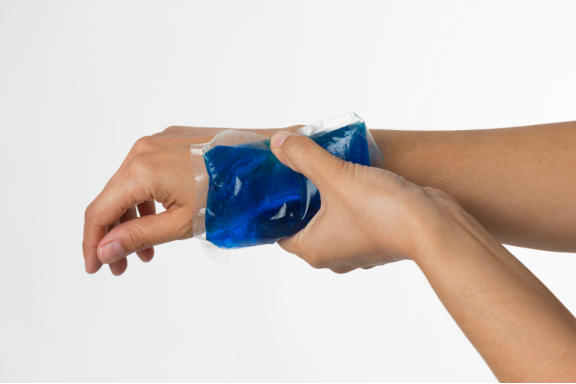
Them’s the breaks
Even though he was at least a foot taller than most of the kids, Pete still played hard at the training. That’s Pete for you. He never wants to take it easy.
At the end of the training, one of the little kids took a shot on goal. Pete said that the ball was probably going wide. To make the kid feel better about his shot, Pete decided to dive for the ball anyway. Poor Pete. He landed on his left thumb in a funny way. (In case you’re wondering, Pete is right-handed. This detail will become important in a little bit.)
Pete knew he hurt himself because his thumb swelled up pretty quickly. His mom took him straight to the doctor after Goalie Training. It turns out that although Pete didn’t break his thumb, he did fracture it. The doctor told him he couldn’t play soccer for six weeks.
“This is the worst news ever,” Pete said to me, shaking his head sadly.
“Six weeks doesn’t seem that bad,” I said, admiring his black splint. “And at least you can still write. Are you allowed to play other sports?” Pete said the doctor only mentioned soccer.
“But I’m not going to ask if it includes more than soccer. I only heard the doctor say soccer,” Pete quietly whispered to me. I’m guessing Pete knew he was supposed to take it easy, so I didn’t say anything.
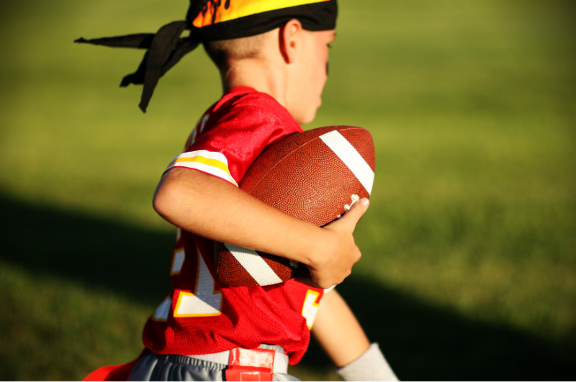
Work hard, play harder
The next day, like usual, Pete met me out in the yard for recess. We were playing two-hand touch football. Jason, another classmate, brought in his football from home.
“I’ll be automatic quarterback for both sides,” Pete said, holding up his left hand to show off his splint. Jason and Jeffrey couldn’t argue with that. But when Pete threw a couple of interceptions, Jason complained that he shouldn’t be quarterback anymore.
“Fine, I’ll play using only my right hand,” Pete said.
“Are you sure that’s a good idea?” I asked Pete. It was hard to play with only one hand. Especially since the doctor said he should take it easy.
“I’ll be careful,” Pete said as if he were reading my mind. I tried to make sure Pete got plenty of handoffs. I wanted him to be careful with his thumb.
Pete didn’t seem to let his injured thumb get in the way at recess.
When it comes to sports, Pete plays at two speeds: hard and harder. I told Pete a couple times that he should take it easy. But Pete wasn’t one to listen.
A few weeks later, Pete had a check-up with his doctor. He seemed really bummed out when I saw him next.

A good rule of thumb
“The doctor says that the fracture got worse,” Pete explained. He looked sadly at his still-fractured thumb. “That means I’m sidelined for another six weeks. And this time, the doctor very clearly said ‘absolutely no sports using my left hand!’”
“That really stinks,” I said, trying to think of something that would make Pete feel better. “Maybe now’s the time to take up darts? Or horseshoes? You can only use one hand for those games.” (FYI, my comment didn’t help Pete’s disappointment one bit.)
“I probably should’ve listened more closely to the doctor’s advice,” Pete said, clenching his good hand.
“Yeah, maybe,” I added, trying not to make Pete feel any worse. I think we both knew that if Pete had taken it easy (even just a little bit) his fracture might’ve healed.
While I’d like to tell you that Pete took it easy during the second six weeks of his fracture, that wouldn’t be true. But Pete did a much better job following his doctor’s orders. He was a lot more careful than before.
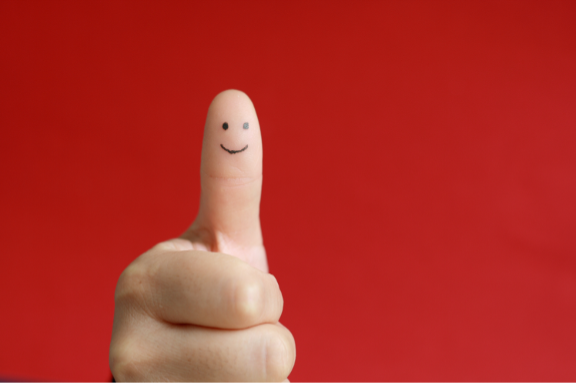
Pete gets a thumb’s up from the doctor
When Pete came back to school after his second check-up, he had a big smile on his face.
“All better,” he said, wiggling his thumb. “I can go back to soccer practice this afternoon. Coach says he needs me on offense.”
“Guess you won’t be needing your thumb so soon then,” I said.
“Not unless I want a penalty,” Pete joked. It was good to see Pete happy again.
While there’s a fifty-fifty chance Pete will return to his hard-charging ways, Pete learned some good lessons to learn from his fractured thumb. The biggest one is to be thankful for what you have—such as your health. Life is pretty unpredictable.
Your situation can change in a split second. (Like when Pete dove for the ball and landed the wrong way.)
Taking care of yourself is another big lesson. When your body is sick or injured, it’s important to take the time to let yourself recover. It’s OK to take to take it easy. Pete needed an extra six weeks because he didn’t slow down.
One other lesson is to appreciate the little things. Even though Pete was able to keep up with his schoolwork, he sometimes needed help with basic stuff like zipping up his coat and cutting his food. (Now that Pete has ten working fingers, I’m sure he’s “counting” his blessings that he’s healthy again.)
While I’m sure there are plenty more things that I could add to this list, I have to practice piano now. Oh wait- that’s another thing you need your thumbs for!
Until next time, be your best you.
What are some things you do when it comes to taking care of yourself? Please share your comments with me below!

